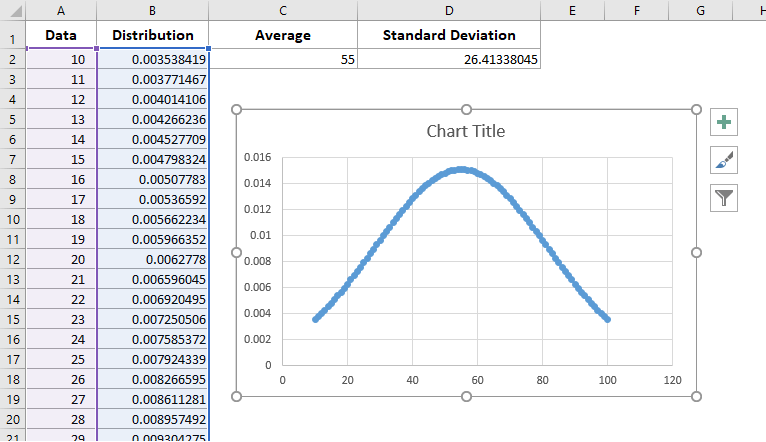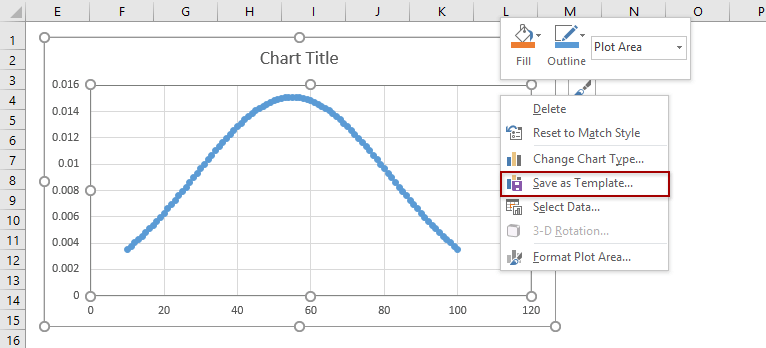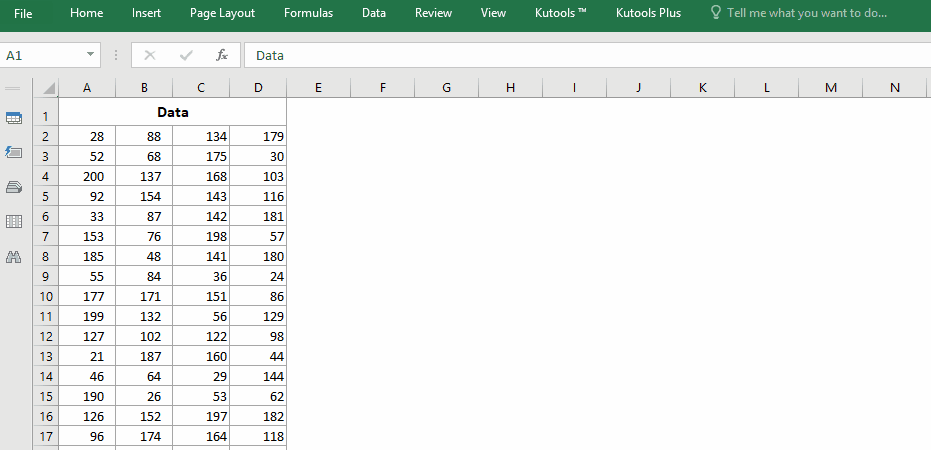How to Create a Bell Curve in Excel With Data
How to create a bell curve chart template in Excel?
Bell curve chart, named as normal probability distributions in Statistics, is usually made to show the probable events, and the top of the bell curve indicates the most probable event. In this article, I will guide you to create a bell curve chart with your own data, and save the workbook as a template in Excel.
- Create a bell curve chart and save as chart template in Excel
- Quickly create a bell curve with an amazing tool
Office Tab Enable Tabbed Editing and Browsing in Office, and Make Your Work Much Easier...
Kutools for Excel Solves Most of Your Problems, and Increases Your Productivity by 80%
- Reuse Anything: Add the most used or complex formulas, charts and anything else to your favorites, and quickly reuse them in the future.
- More than 20 text features: Extract Number from Text String; Extract or Remove Part of Texts; Convert Numbers and Currencies to English Words.
- Merge Tools: Multiple Workbooks and Sheets into One; Merge Multiple Cells/Rows/Columns Without Losing Data; Merge Duplicate Rows and Sum.
- Split Tools: Split Data into Multiple Sheets Based on Value; One Workbook to Multiple Excel, PDF or CSV Files; One Column to Multiple Columns.
- Paste Skipping Hidden/Filtered Rows; Count And Sum by Background Color; Send Personalized Emails to Multiple Recipients in Bulk.
- Super Filter: Create advanced filter schemes and apply to any sheets; Sort by week, day, frequency and more; Filter by bold, formulas, comment...
- More than 300 powerful features; Works with Office 2007-2019 and 365; Supports all languages; Easy deploying in your enterprise or organization.
Create a bell curve chart and save as a chart template in Excel
To create a bell chart with your own data, and then save it as an Excel template, you can do as following:
1. Create a blank workbook, and enter the column header In Range A1:D1 as following screen shot shows:

2. Enter your data into the Data column, and sort the data by clicking by clicking Data > Sort.
In our case, we enter from 10 to 100 into Rang A2:A92 in the Data Column.

3. Calculate the data as follows:
(1) In Cell C2, please type in below formula to calculate the average:
=AVERAGE(A2:A92)
(2) In Cell D2, please enter below formula to calculate the standard deviation:
=STDEV(A2:A92)
(3) In Cell B2, please type in one of below formulas, and drag the AutoFill Handle to the Range A3:A92.
| A. In Excel 2010 or later versions: =NORM.DIST(A2,$C$2,$D$2,FALSE) | B. In Excel 2007: =NORMDIST(A2,$C$2,$D$2,FALSE)) |
Note : The A2:A92 is the range we enter our data, and please change the A2:A92 to the range with your data.

4. Select the Range A2:B92 (Data column and Distribution column) ,and click the Insert > Scatter ( or Scatter and Doughnut chart in Excel 2013) > Scatter with Smooth Lines and Markers.

Then a bell curve chart is created showing as following screen shot.

You can format the bell curve by removing legends, axis, and gridlines in the bell curve chart.
And now you can save the created bell curve chart as a normal chart template in Excel with following steps:
5. Save the bell curve chart as a chart template:
A. In Excel 2013 or later versions, right click the bell curve chart, and select the Save as Template from the right-clicking menu;
B. In Excel 2007 and 2010, click the bell curve chart to activate the Chart Tools, and then click the Design > Save As Template.

6. In the popping up Save Chart Template dialog box, enter a name for your template in the File name box, and click the Save button.

First-class tool helps you 2 steps to create a bell curve chart in Excel
An amazing Excel add-in, Kutools for Excel, provides 300+ features to help you improve work efficiency greatly. And its Normal Distribution / Bell Curve (chart) feature makes it possible to create a perfect bell curve chart with only 2 steps! Get it now!

Kutools for Excel - Includes more than 300 handy tools for Excel. Full feature free trial 30-day, no credit card required! Get It Now
Quickly create a bell curve with an amazing tool
In this method, I will introduce the Normal Distribution / Bell Curve feature of Kutools for Excel. This feature will help you easily create a bell curve chart with only two clicks. In addition, this feature also supports to create a frequency histogram chart, and a combo chart of bell curve and frequency histogram as well.
Kutools for Excel: contains more than 300 handy tools for Excel. Free to try with no limitation in 60 days. Get it now!
1. Select the data range you will create a bell curve based on, and click Kutools > Charts > Normal Distribution / Bell Curve. See screenshot:

2. In the opening dialog, check the Normal distribution chart option in the Select section, and click the OK Button. See screenshot:

Tips:
(1) It's optional to type in the Chart title in the Chart title box;
(2) If you need to create a frequency histogram chart, please check the Frequency histogram chart option only in the Select section; for a combo chart of bell curve and frequency histogram, please check both options in the Select section.
If you only check the Normal Distribution chart option:

If you check both Normal Distribution chart and Frequency histogram chart options:

Save created bell curve chart as AutoText entry for easy reusing with only one click
In addition to saving the created Bell Curve chart as a chart template for reusing in future, Kutools for Excel's AutoText utility supports Excel users to save created chart as an AutoText entry and reuse the AutoText of chart at any time in any workbook with only one click. Get it now!

Kutools for Excel - Includes more than 300 handy tools for Excel. Full feature free trial 30-day, no credit card required! Get It Now
Demo: Create a bell curve chart template in Excel
Kutools for Excel includes more than 300 handy tools for Excel, free to try without limitation in 30 days. Download and Free Trial Now!
Related Articles
The Best Office Productivity Tools
Kutools for Excel Solves Most of Your Problems, and Increases Your Productivity by 80%
- Reuse: Quickly insert complex formulas, charts and anything that you have used before; Encrypt Cells with password; Create Mailing List and send emails...
- Super Formula Bar (easily edit multiple lines of text and formula); Reading Layout (easily read and edit large numbers of cells); Paste to Filtered Range...
- Merge Cells/Rows/Columns without losing Data; Split Cells Content; Combine Duplicate Rows/Columns... Prevent Duplicate Cells; Compare Ranges...
- Select Duplicate or Unique Rows; Select Blank Rows (all cells are empty); Super Find and Fuzzy Find in Many Workbooks; Random Select...
- Exact Copy Multiple Cells without changing formula reference; Auto Create References to Multiple Sheets; Insert Bullets, Check Boxes and more...
- Extract Text, Add Text, Remove by Position, Remove Space; Create and Print Paging Subtotals; Convert Between Cells Content and Comments...
- Super Filter (save and apply filter schemes to other sheets); Advanced Sort by month/week/day, frequency and more; Special Filter by bold, italic...
- Combine Workbooks and WorkSheets; Merge Tables based on key columns; Split Data into Multiple Sheets; Batch Convert xls, xlsx and PDF...
- More than 300 powerful features. Supports Office/Excel 2007-2019 and 365. Supports all languages. Easy deploying in your enterprise or organization. Full features 30-day free trial. 60-day money back guarantee.

Office Tab Brings Tabbed interface to Office, and Make Your Work Much Easier
- Enable tabbed editing and reading in Word, Excel, PowerPoint , Publisher, Access, Visio and Project.
- Open and create multiple documents in new tabs of the same window, rather than in new windows.
- Increases your productivity by 50%, and reduces hundreds of mouse clicks for you every day!

How to Create a Bell Curve in Excel With Data
Source: https://www.extendoffice.com/documents/excel/2404-excel-template-bell-curve-chart.html